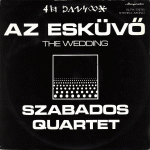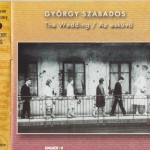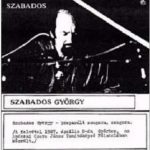– COMPOSITIONS –
 Az esküvő
Az esküvő
 The Wedding
The Wedding
 Die Hochzeit
Die Hochzeit
Year of writing:
1974
First known performance:
May 20 – 25, 1974
Year of publishing:
1975
Music Publisher:
Hungaroton / Pepita SLPX 17475
Note:
![]()
![]() 2016: Yvetta Kajanová, Gertrud Pickhan und Rüdiger Ritter (Szerk.), Jazz From Socialist Realism to Postmodernism (Jazz a szocialista realizmustól a posztmodernig) Frankfurt: Peter Lang, 2016, pp. 83–103. / A vonatkozó fejezet: Szegedi Márton: »Hungarian Free Jazz: Kompositions- und Improvisationsstrukturen in der Musik von György Szabados am Beispiel des Stückes ›The Wedding‹. (Magyar szabad jazz: kompozíciós és improvizációs struktúrák Szabados György zenéjében “Az esküvő” példáján bemutatva)
2016: Yvetta Kajanová, Gertrud Pickhan und Rüdiger Ritter (Szerk.), Jazz From Socialist Realism to Postmodernism (Jazz a szocialista realizmustól a posztmodernig) Frankfurt: Peter Lang, 2016, pp. 83–103. / A vonatkozó fejezet: Szegedi Márton: »Hungarian Free Jazz: Kompositions- und Improvisationsstrukturen in der Musik von György Szabados am Beispiel des Stückes ›The Wedding‹. (Magyar szabad jazz: kompozíciós és improvizációs struktúrák Szabados György zenéjében “Az esküvő” példáján bemutatva)
The title-composition, The Wedding, essentially contains all those characteristics and achievements that are typical of the quartet. Throughout the piece runs the tense and timeless atmosphere of the wedding rhythm, an anguished-hopeful moment of past and future. The musical material is dominated by the passionate, broadly dynamic unity of the piano and the violin, and by the characteristically East European asymmetric rhythm which, with a proper feeling, is joined into a homogeneous fabric by the polyrhythmic improvisation on the drum to produce a new phenomenon in the realm of jazz. The playing of the double-bass draws to the school of Jimmy Garrison and Charlie Haden, but opening the piece in an individual tone and with such an inspiration that one is captivated from the first moment by the profundity and earnestness of its message. The composition is imbued with anguish and force, gloom and dancing joy, with the stubborn rhythm evoking, as it were, the invincibility of life.
A lemez címadó kompozíciója, Az esküvő lényegében mindazokat a jellegzetességeket és eredményeket tartalmazza, amelyek a kvartettet jellemzik. Az esküvői ritmus feszült és időtlen atmoszférája, a múlt és a jövő szorongató-bízó pillanata a darab. A zongora és a hegedű szenvedélyes, szélesen dinamikus összjátéka és a jellegzetesen kelеteurópai aszimmetrikus ritmusok uralják a zenei anyagot, amit a dob jó érzékkel fűz egységes szövetté, s melyeknek poliritmikus-improvizatív alkalmazása új jelenség a jazz világában. A bőgő játéka elsősorban Jimmy Garrison és Charlie Haden iskolájára utal, de egyéni hangon és oly ihletetten indítja a darabot, hogy az első pillanattól megragad a mondanivaló mélysége és komolysága. A kompozíción szorongás és erő, szomorúság és táncos öröm leng át, a makacs ritmussal mintegy az élet lebírhatatlanságát jelenítve meg.
Die Titel-Komposition, Die Hochzeit enthält wesentlich alle Merkmale und Ergebnisse, die das Quartett charakterisieren. Das Stück ist die gespannte und zeitlose Atmosphäre des Hochzeit-Rhythmus, der bedrückend-zuversichtliche Augenblick der Vergangenheit und der Zukunft. Das leidenschaftliche, breit dynamische Zusammenspiel von Klavier und Geige sowie typisch osteuropäische asymmetrische Rhythmen beherrschen das Musikmaterial, das das Schlagzeug mit gutem Gefühl zu einem einheitlichen Gewebe verflechtet. Die polyrhythmisch-improvisative Anwendung von diesem ist eine neue Erscheinung in der Welt des Jazz. Das Spiel der Baßgeige deutet in erster Linie auf die Schule von Jimmy Garrison und Charlie Haden, aber es beginnt das Stück mit einem individuellem Ton und dermaßen inspiriert, daß beim Hörer Tiefe und Ernst der Aussage vom ersten Moment an haften bleiben. Beklommenheit und Kraft, Traurigkeit und tänzerische Freude schimmern durch die Komposition, mit dem hartnäckigen Rhythmus die Unmöglichkeit der Überwältigung des Lebens vergegenwärtigend.
LIST OF RELEASES:

![]()
![]()
![]() 1974: Az esküvő (The Wedding)
1974: Az esküvő (The Wedding)
Recordings:
Recording Date: May, 20 – 25, 1974
Recorded at: Hungaroton Studio, Budapest / Time 11:40
Musicians:
![]() György Szabados Quartet
György Szabados Quartet
Szabados György (piano)
![]() Vajda Sándor (bass)
Vajda Sándor (bass)
![]() Kőszegi Imre (drums)
Kőszegi Imre (drums)
![]() Kathy-Horváth Lajos jr. (violin, bass)
Kathy-Horváth Lajos jr. (violin, bass)

![]()
![]()
![]() 1964; 1974; 1981; 1982: Hungarian Jazz History 8 – György Szabados
1964; 1974; 1981; 1982: Hungarian Jazz History 8 – György Szabados
Recordings:
Recording Date: May, 20 – 25, 1974
Recorded at: Hungaroton Studio, Budapest / Time 11:44
Musicians:
![]() György Szabados Quartet
György Szabados Quartet
Szabados György (piano)
![]() Vajda Sándor (bass)
Vajda Sándor (bass)
![]() Kőszegi Imre (drums)
Kőszegi Imre (drums)
![]() Kathy-Horváth Lajos jr. (violin, bass)
Kathy-Horváth Lajos jr. (violin, bass)
PLAYLIST:
read more infos about playlist: #1: 11:44 Musicians: Related items: #2: Az esküvő (2. téma) 5:15 Musicians: Related items: #3: Az esküvő (2. téma) 5:20 Musicians Related items: #4: Az esküvő (2. téma) together with piece Régi ima [2. téma] (Old Prayer) 5:16 Musicians: Related items: #5: Az esküvő (2. téma) 2:18 Musicians: Related items: #6: Az esküvő (2. téma) 2:56 Musicians: Related items: #7: Az esküvő (2. téma) 2:58 Musicians: Related items: #8: Az esküvő (2. téma) 2:22 Musicians: Related items: #9: 21:21 Musicians: Related items:
Recording Date: May, 20 – 25, 1974
Recorded at: Hungaroton Studio, Budapest
György Szabados Quartet
Szabados György (piano)
Vajda Sándor (bass)
Kőszegi Imre (drums)
Kathy-Horváth Lajos jr. (violin, bass)
![]()
![]()
![]()
![]() 1975 released as LP: “The Wedding / Az esküvő”
1975 released as LP: “The Wedding / Az esküvő”
![]()
![]()
![]()
![]() and 2001 again as a remaster on the compilation CD: “The Wedding / Az esküvő plus 3 Bonus Tracks – Jazz History 8”
and 2001 again as a remaster on the compilation CD: “The Wedding / Az esküvő plus 3 Bonus Tracks – Jazz History 8”
![]() Gábor Turi – Jazz Forum No. 41 / 1976
Gábor Turi – Jazz Forum No. 41 / 1976
![]() The Essential Jazz Records (Max Harrison, Eric Thacker, Stuart Nicholson): – Volumne 2: (published Mansell Publishing Limited – 2000)
The Essential Jazz Records (Max Harrison, Eric Thacker, Stuart Nicholson): – Volumne 2: (published Mansell Publishing Limited – 2000)
![]() published 2008: jbsz.hu
published 2008: jbsz.hu
![]() Germar v.Mönch – published Jazzthetik, No. 18/11, Nov.2004
Germar v.Mönch – published Jazzthetik, No. 18/11, Nov.2004
![]() Mathias Bäumel – published Jazzzeitung 11.02.2015
Mathias Bäumel – published Jazzzeitung 11.02.2015
![]() Krzysztof Szatrawski – published online: http://szatrawski.blogspot.de 31.May 2015
Krzysztof Szatrawski – published online: http://szatrawski.blogspot.de 31.May 2015
————————
Recording Date: Spring 1979
Recorded at: Live at SOTE Klub, Budapest (HU)
György Szabados Solo
Szabados György – piano
![]()
![]() Audience recording
Audience recording
——————-
Recording Date: 1983, 13 March
Recorded at: Ifjúsági Ház, Györ,
Szabados György (prep. piano)
![]() Review by Jenő Hartyándi published in JazzForum No. 82 / 1983
Review by Jenő Hartyándi published in JazzForum No. 82 / 1983
![]() Review by Gábor Turi in Jazz, 1983/2
Review by Gábor Turi in Jazz, 1983/2
![]() Article by Gábor Turi: Nagy fekete zene in Hajdú-bihari Napló, 1983
Article by Gábor Turi: Nagy fekete zene in Hajdú-bihari Napló, 1983
![]() Poster of the concert
Poster of the concert
—————-
Recording Date: May 28, 1983
Recorded at: „1. Daxberger Situationen”, Jazz Festival, Daxberg, Germany
György Szabados Solo
Szabados György – piano
![]()
![]() Szabados Solo
Szabados Solo
![]() Reviews & Articles
Reviews & Articles
![]() Review by Joachim Kaupp, Main-Echo, 1983, 31 May
Review by Joachim Kaupp, Main-Echo, 1983, 31 May
![]() view photos of the performances
view photos of the performances
![]() view poster of “1. Daxberger Situation 1983”
view poster of “1. Daxberger Situation 1983”
—————–
Recording Date: July 13, 1983
Recorded at: 12. Debreceni Jazz Napok, Kölcsey Művelődési Központ, Debrecen, (HU)
György Szabados Solo
Szabados György – piano
![]()
![]() Audience recording
Audience recording
![]() TV Video recording (excerpt with interview)
TV Video recording (excerpt with interview)
![]() Review by Bert Noglik – Jazz Podium 1983/10
Review by Bert Noglik – Jazz Podium 1983/10
![]() Review by Turi Gábor – Jazz Forum No. 84, published 1983
Review by Turi Gábor – Jazz Forum No. 84, published 1983
![]() Review by Turi Gábor – Hajdú-bihari Napló, 1983
Review by Turi Gábor – Hajdú-bihari Napló, 1983
![]() Review by Turi Gábor – Jazz, 1983/3
Review by Turi Gábor – Jazz, 1983/3
——————-
Recording Date: November 27, 1985
Recorded at: Live in Szolnok (HU)
György Szabados Solo
Szabados György – piano
![]()
![]() Audience recording
Audience recording
![]() Lemezbörzétől a koncertekig – Szolnok Megyei Néplap, 1986.01.31
Lemezbörzétől a koncertekig – Szolnok Megyei Néplap, 1986.01.31
——————-
Recording Date: April 8, 1987
Recorded at: “Apáczai Csere János TK Főiskola”, Győr, (HU)
György Szabados Solo
Szabados György (piano)
![]() Audience recording
Audience recording ![]() CD 1
CD 1 ![]() CD 2
CD 2
![]() Concert was also filmed by Jenő Hartyándi and later released as “LOST FRAGMENTS 2” on “MEDIAWAVE Regional Film und TV Archives“
Concert was also filmed by Jenő Hartyándi and later released as “LOST FRAGMENTS 2” on “MEDIAWAVE Regional Film und TV Archives“
![]() Koncert program posters
Koncert program posters
——————-
Recording Date: November 8, 1987
Recorded at: Jazzfest ’87, Berlin, Germany
György Szabados Solo
Szabados György (piano)
![]()
![]() Radio recording
Radio recording
![]() Programm booklet
Programm booklet
——————-
Recording Date: April 9 – 11, 2015
Recorded at: Hunnia Records Studio, Törökbálint(HU)
Grencsó István – soprano & tenor saxophone, bass clarinet, pipe
Pozsár Máté – piano
Benkő Róbert – double bass
Miklós Szilveszter – drums, percussion
Mezei Szilárd – viola
![]()
![]()
![]()
![]() 2015: Derengés / Dawn (Compositions by György Szabados)
2015: Derengés / Dawn (Compositions by György Szabados)
VIDEOS:
Az esküvő (2. téma) / Time: 2:06
Recording Date: April 8, 1987
Recorded at: “Apáczai Csere János TK Főiskola”, Győr, (HU)
Musicians:
György Szabados Solo
Szabados György (piano)
